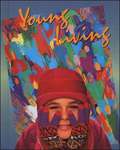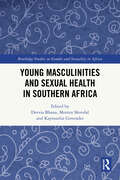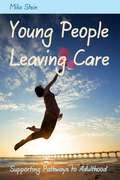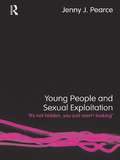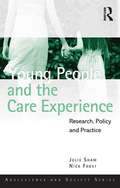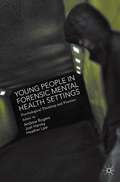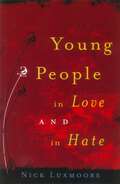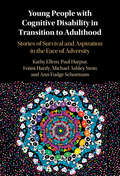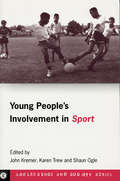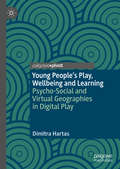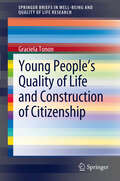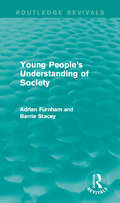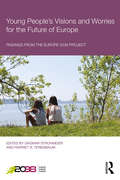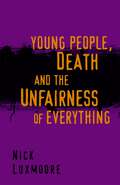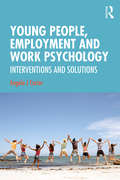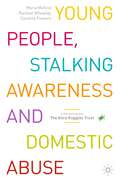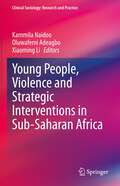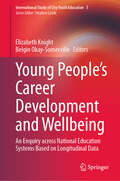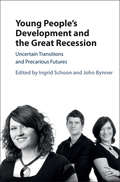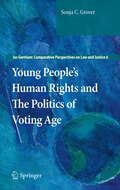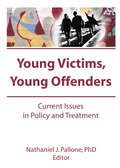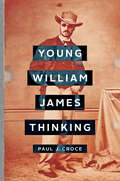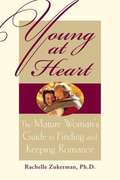- Table View
- List View
Young Living (Eighth Edition)
by Nanalee ClaytonBuild a foundation of life management skills for your middle school students. Solid content and a vibrant visual appeal make this text a favorite comprehensive overview of all family and consumer sciences areas.
Young Masculinities and Sexual Health in Southern Africa (Routledge Studies on Gender and Sexuality in Africa)
by Deevia Bhana Kaymarlin Govender Morten SkovdalThis book examines the complex relationships between young masculinities and sexual health within Southern Africa. It considers how socio-cultural and economic factors shape young men’s experiences of masculinity and the effects on relationship dynamics, gender norms and sexual health.Through thematic chapters covering love, pleasure, social norms, risk, and HIV, the book emphasises the global importance of engaging young men in fostering gender equity and promoting healthier sexual practices. Readers will benefit from a diverse range of methodologies and perspectives that highlight the plurality and fluidity of masculinities, challenging monolithic accounts of young men in the region whilst illustrating the global relevance of understanding local contexts in shaping masculinities. The book provides valuable insights for developing effective sexual health interventions that recognise and embrace 'other' masculinities. Sexual health approaches that resonate with the lived realities of young men can potentially enhance young men’s engagement and participation in promoting healthier relationships and practices.With important insights for theory, policy, and practice, this book will be of interest to researchers across the fields of critical masculinity studies, sexual and reproductive health, gender studies and African studies, as well as policymakers, development practitioners, and activists.
Young Minds in Social Worlds: Experience, Meaning, and Memory
by Katherine NelsonKatherine Nelson re-centers developmental psychology with a revived emphasis on development and change, rather than foundations and continuity. She argues that children be seen not as scientists but as members of a community of minds, striving not only to make sense, but also to share meanings with others. A child is always part of a social world, yet the child's experience is private. So, Nelson argues, we must study children in the context of the relationships, interactive language, and culture of their everyday lives. Nelson draws philosophically from pragmatism and phenomenology, and empirically from a range of developmental research. Skeptical of work that focuses on presumed innate abilities and the close fit of child and adult forms of cognition, her dynamic framework takes into account whole systems developing over time, presenting a coherent account of social, cognitive, and linguistic development in the first five years of life. Nelson argues that a child's entrance into the community of minds is a slow, gradual process with enormous consequences for child development, and the adults that they become. Original, deeply scholarly, and trenchant, Young Minds in Social Worlds will inspire a new generation of developmental psychologists.
Young People Leaving Care: Supporting Pathways to Adulthood
by Mike SteinThe journey to adulthood is a big step for all young people. However, for young people leaving care it may be far more difficult, coping with major changes in their lives and at a younger age, especially if they lack preparation and support. Young People Leaving Care explores the journey from care to adulthood through the main challenges these young people face: in being in settled accommodation, in fulfilling their potential in education, employment or training, and in achieving and maintaining good health and a positive sense of wellbeing. For each of these pathways, the book provides a comprehensive review of relevant research, how young people might be best supported, and how the services they receive have the potential to increase resilience and boost their chances of enjoying a fulfilled life as a young adult. This is an essential book for all those who work with young people from care, including social workers, personal advisers, counsellors, teachers, policy makers, researchers and students in the field of child welfare.
Young People and Sexual Exploitation: 'It's Not Hidden, You Just Aren't Looking'
by Jenny J. PearceWork with sexually exploited young people can be rewarding yet difficult. They can be hard to access, often presenting challenging behaviour. Sometimes it is painful to hear their life stories, whether these include abuse through the Internet or exploitation experienced through having been trafficked into and within the country. Jenny J. Pearce draws on young people’s voices to explore the difficulties that arise for researchers and for practitioners when working with sexually exploited young people. While child protection interventions must guide social work, she argues that other agencies such as health, education, housing and training each have a role to play in supporting a sexually exploited young person. Challenging the uncritical acceptance of the child as victim, the book suggests ‘therapeutic outreach’ as an approach to working with sexually exploited young people that can complement child protection procedures, support practitioners in the field and enhance the young person’s sense of autonomy and responsibility during their transition to adulthood. The book advocates the relationship between practitioners and the young people they aim to support to be one of the most important resources in practice. Young People and Sexual Exploitation will be essential reading for anyone interested in preventing the sexual exploitation of children and young people. It will be particularly relevant for academics, students, practitioners and policymakers in the fields of social policy and social work, child and family work, child protection and youth work.
Young People and the Care Experience: Research, Policy and Practice (Adolescence and Society)
by Julie Shaw Nick FrostThe care system looks after the most vulnerable young people in society – those who are, for a variety of reasons, unable to live with their parents. Young People and the Care Experience examines what can be done to support young people to remain at home, and if this is not possible, how they can be supported whilst in care and on leaving care. The book explores the range of options – foster care, children’s homes and adoption – and how these options interact. Using the latest research and framing the issues through both psycho-social and legal perspectives, the book provides an in-depth analysis of young people’s experience of the care system, and how it can be improved. Examining the challenges faced by children on their journey from initially entering care to living independently after care, the book places these issues in a global context. Specifically, it discusses how to support children and young people at home an analysis of the history and demographics of children placed in care the challenges faced by children living in foster care the challenges faced by children living in a children’s home. the challenges faced by children being adopted leaving care The book will be of interest to all those working with children in care, or those who have experience of the care system as a professional, carer or young person. It will also be of interest to researchers and students of developmental and social psychology, social work, and also to policy makers.
Young People in Forensic Mental Health Settings: Psychological Thinking and Practice
by Joel Harvey Andrew Rogers Heather LawYouth crime and youth violence blights our communities and shapes the lives of many, whether they are victims, perpetrators or family members. This book examines the application of psychological thinking and practice when working with young people who display high risk behaviours across a broad range of forensic mental health settings in the UK. It provides an up-to-date account of current thinking and practice in the field and the challenges of applying effective psychological approaches within forensic settings for young people. The contributors to Young People in Forensic Mental Health Settings are drawn from a range of environments including universities, youth offending services, secure in-patient settings, young offender institutions, Community Forensic Child and Adolescent Mental Health Services (F-CAMHS), and secure children's homes. This volume serves as an important platform for debate and as a forum for discussing the future delivery of psychologically informed services, intervention and mental health provision with young people who display high-risk behaviours.
Young People in Love and in Hate
by Nick LuxmooreThis book is about boyfriends and girlfriends - getting them, keeping them and moving on from them. Young people put enormous energy into these processes: they worry, they hope, they conspire and they cry because, in a sense, having a boyfriend or girlfriend is about much more than just having a boyfriend or girlfriend. Using dozens of recognisable vignettes, Luxmoore movingly describes his work with young people. In particular, he explores the dramatic conflict between young people's loving and hating as they move from the intimacy of relationships with parents to relationships with boyfriends and girlfriends, frantically negotiating sex and sexuality, the meaning of love, faithfulness and unfaithfulness and many other issues vital to the adults these young people will become. The book will be essential reading for professionals and parents struggling with the ferocity of young people's feelings where 'I love you!' and 'I hate you!' are never far apart.
Young People with Cognitive Disability in Transition to Adulthood: Stories of Survival and Aspiration in the Face of Adversity
by Kathy Ellem Paul Harpur Fotina Hardy Michael Ashley Stein Ann Fudge SchormansThis book presents the lived experiences of young people with cognitive disability and their struggles as they transition to adulthood. Whether you are a young person yourself looking to transition to adulthood, a parent, or a professional supporting a young person, this book will help you understand the systemic failures which have caused abuse, exploitation, neglect and violence. But it will also outline the inner and outer resources which have enabled young people to maintain their self-belief and overcome adversity. Despite the fact society is failing these young people, the young people in this book speak of belief and have hope for the future. Drawing upon the United Nations human rights framework, this book provides a narrative for empowerment and reform. It involves the input of co-researchers with disability and includes Easy English summaries in each chapter to ensure its accessibility to young people with cognitive disability.
Young People's Involvement in Sport (Adolescence and Society)
by John Kremer Karen Trew Shaun OgleBased on survey data derived from face-to-face interviews with 2,400 schoolchildren, 600 four-day diaries and focus groups with both elite performers, coaches and parents, the book offers a comprehensive overview of young people's involvement in sport and physical activity in the 1990s. Deliberately set in the context of the literature on sport involvement and participation motivation, and alongside wider policy concerns, individual contributors each have accessed the data in order to address a particular substantive topic.Given the almost complete absence of hard data currently available in this field, the book should appeal not only to a local audience but to a wider international readership including sport scientists, sports' administrators, coaches, teachers and policy makers, indeed anyone with an interest in the who, what, why and how of young people's involvement in sport.
Young People's Play, Wellbeing and Learning: Psycho-Social and Virtual Geographies in Digital Play
by Dimitra HartasThis book explores the shifting geographies and contexts of children's play and learning. The author examines both free and guided play through the lenses of class, gender and disability, drawing links between face-to-face and online interactions. As young people increasingly spend time in virtual environments it is important to adjust understandings of how, and when, they engage with learning. The book examines play as a continuum of activities and peer interactions, interrogating what it takes to bridge the gap between academic and wellbeing goals for children with disabilities and disadvantage, as well as those at the intersection with other markers of difference (e.g. gender and race). It will be of interest and value to scholars of play and education, as well as those working with disabled or disadvantaged children.
Young People's Quality of Life and Construction of Citizenship
by Graciela TononThe study of quality of life refers to the material environment (social welfare) and psychosocial environment (wellbeing). It has been defined as a concept that implies the objective and subjective dimension that Cummins (1997) first studied in seven domains. The use of domains in the quality of life study allows a more precise measurement than the one that could have been reached through simple questions, since psychometric scales are used and if the addition of domains is equivalent to the totality of life satisfaction, then the group of domains is a valid measure of quality of life. In the case of young people, it has been observed that even if they live in negative physical, social and contextual conditions, they can nevertheless experience a relatively positive experience in relation to their quality of life, depending on the strategies and capabilities that they generate in relation to the context. Similarly, young people that live in favorable socioeconomic conditions and with a trouble free psychological situation may experience a relatively poor evaluation of their position in life (Patrick et al). oung people do not form a homogenous group and, in this sense, it is not possible to generalize about youth; they interact with the environment in which they live and they are a product of the history they happen to live, in this way they transit different vital scenarios in daily life that affect their quality of life. The social representations about youth that each population has, in each historical moment, are embedded in the social context in which young people live and develop, conditioning every-day life and /or creating related stereotypes. The concept of youth is a social construction built conjointly by all members of society in the historical moment in which they live. Young people interact with the environment in which they live and they are a product of the history they happen to live. Authors like Urresti (1999) define youth from a point of view that takes into account the living together of different generations in different societies, thus being impossible to compare young people of today with those of two or three decades ago; in addition, he states that it is necessary to situate the understanding of youth within the historical and social moment in which they live. Nowadays the predominant adult model is based in individualism, and even if an intergenerational dialogue is necessary, it is difficult for young people to achieve this kind of communication with adults that, in some cases, are living "stages of youth" or that need to be "forever young". Young people live in uncertainty, with a limited perspective for future action, assigning their own meaning to events and facts, according to their fundamental concerns that are significantly different from those of their parents' generation. In the other side the process of globalization and the protagonist social role of the new informational and communicational technologies, produce that the possibilities to expand individual freedoms increase, but not all young people can manage with it (Lechner, 2002). What young people need in order to construct their citizenship and feel satisfied, varies according to the different societies, especially considering that most of them live a fragile situation. As Cortina (2003:7-9) states, the idea of citizenship always transcends individualism, because the citizen is somebody that exists together with others, and those others are equal to him before the city, is somebody that deliberates with others, that acts with others conjointly, that assumes the protagonist role of his own life, in this way citizen is not only that who the law protects, but that who participates in the public issues. Speaking about young people we propose to recognize them from their equal dignity because "recognition is not only a courtesy that we owe others: it is an essential human need" (Taylor, 1993:46). This recognition is based in human dignity and tends to protect the basic rights of people as individuals and to recognize the particul...
Young People's Understanding of Society (Adolescence And Society Ser.)
by Adrian FurnhamFirst published in 1991, this book represents the first wide-ranging review of young people’s understanding of the social world and the functioning of society. Taking a social cognitive view of adolescence, it focuses on the processes by which young people learn to understand other people’s thoughts, emotions, intentions and behaviour. Concentrating on the social world of politics, economics, work, gender and religion, the authors cover such issues as: politics and government; work and unemployment; law and legislative matters; religion; marriage and the family; social class; and racial and ethnic differences. This work will be of interest to students of sociology and psychology.
Young People's Visions and Worries for the Future of Europe: Findings from the Europe 2038 Project
by Dagmar Strohmeier Harriet R. TenenbaumIn a period in which the future of the European Union is subject to increased scrutiny, it is more vital than ever that the thoughts and views of younger generations are considered. Young People’s Visions and Worries for the Future of Europe: Findings from the Europe 2038 Project seeks to do exactly that, presenting the findings of a large-scale research project investigating the opinions and worries of young people between the ages of 16 and 25 across seven European countries. In this unique and timely volume, Strohmeier and Tenenbaum, together with the Europe 2038 consortium, examine young people’s endorsement of multiculturalism, diversity, European identity, human rights, and political participation, and unpick the cross-national differences in a range of European countries. Young People’s Visions and Worries for the Future of Europe concludes by formulating effective evidence-based recommendations for policy and practice. This work is essential reading for advanced level undergraduate and masters level courses in Psychology, Social Work, Politics, Sociology, Social Policy, and Education, as well as researchers in those fields.
Young People, Death and the Unfairness of Everything
by Nick LuxmooreA taboo subject in today's society, death is something that we do not like to talk about and especially do not like young people talking about. Yet, without opportunities to talk, young people's anxieties about death can manifest themselves in all sorts of self-destructive and socially-destructive ways. In this book, Nick Luxmoore explores the problems that arise when death is not openly discussed with young people and offers invaluable advice about how best to allay concerns without having to pretend that there are easy answers. He covers all of the key issues from the physicality of death to the fear of not existing to the way young people's morality develops and he provides expert insight into the impact these subjects have on young people's behaviour. This book presents a wealth of information for professionals, parents and others working with young people, providing the skills needed to ask young people the difficult question, "Do you think much about death?", and to support them as they begin their answer.
Young People, Employment and Work Psychology: Interventions and Solutions
by Angela J CarterYouth unemployment and underemployment is a serious issue in most developed countries in the world. Having few young people in the workplace has serious and lasting consequences for generations of young people, their families, businesses and society as a whole. Dr Carter explores these important issues from multiple (and international) perspectives, offering research evidence and guiding frameworks from social and work psychology, to get more young people into good work. Young People, Employment and Work Psychology brings together educators, researchers, occupational psychologists, and government agencies responding to young people struggling to gain and sustain employment. Theoretically based and evidence-driven, this book explores the consequences of unemployment, suggests ways in which businesses can enable young people's first steps into employment and gives practical advice to young people and employers to prepare for and gain entry-level roles and develop more diverse workplaces. From the reasons why organizations are often reluctant to employ young people, to issues of motivation and confidence which often affect young people’s perspective in looking for work, the book covers several interventions within both the public and private sector. This book is an invaluable resource for employers, policy makers and professionals working with young people, as well as students and researchers in work and organizational psychology, HRM, business management and social policy.
Young People, Stalking Awareness and Domestic Abuse
by Maria Mellins Rachael Wheatley Caroline FlowersThis book addresses domestic abuse and stalking among young people in the UK and Ireland, with a focus on intersectionality and lifestyle settings. In partnership with the Alice Ruggles Trust, this book draws on a wealth of expert contributions including those with lived experience, frontline services such as Paladin National Stalking Advocacy Service, charities EmilyTest and Hollie Gazzard Trust, researchers of so-called honour-based abuse and online harms, and forensic psychologists who work with people who stalk. It begins with an overview of ways to recognise harmful behaviours, including those carried out online. The discussion then moves on to methods and motivations of stalking and coercive control and the various lifestyle contexts including education environments, young people in the workplace, and the role of the police and frontline support services in tackling these issues. It is a vital resource for undergraduate students across criminology, sociology, law, psychology, education, social justice, policing, and forensic psychology, as well as a combination of academic researchers and professionals working within stalking and domestic abuse support and prevention. This action-orientated book also includes 'Key Points' and ‘Discussion Questions’ in each chapter to direct student learning in the classroom and to create discussion points for wider readers.
Young People, Violence and Strategic Interventions in Sub-Saharan Africa (Clinical Sociology: Research and Practice)
by Xiaoming Li Oluwafemi Adeagbo Kammila NaidooThis edited volume offers a rich collection of up-to-date research and critical scholarship from various African institutions on incidents of youth violence, intervention and prevention in sub-Saharan Africa. It integrates thinking, evidence, responses, and debates relating to this topic, laying the basis for fresh insights and innovative strategies. The chapters capture a spectrum of pertinent issues such as economic hardship, lockdowns, sexual and reproductive health, pregnancy, online sexual harassment, xenophobic violence, and micro-aggressions in school contexts, and present guidelines on how countries might learn from successful interventions recently implemented. They explore young people’s access to familial and community resources, state-sponsored initiatives, peer counselling, youth-friendly services, and other relevant structures. Thus, among other things, this volume stimulates further debate on what is driving violence in different African contexts—specifically, how intersectional identities create vulnerabilities to violence—and influences ways of dealing with the issue. This interdisciplinary and cross-cutting volume serves as a vital resource for experts at universities, in international organisations, civil society groups and intergovernmental organisations who wish to both analyse and take action to address and prevent the type of violence that currently afflicts young people sub-Saharan Africa today.
Young People’s Career Development and Wellbeing: An Enquiry across National Education Systems Based on Longitudinal Data (International Study of City Youth Education #5)
by Elizabeth Knight Belgin Okay-SomervilleThis book explores how career development experiences during education are relevant for wellbeing in youth career transitions from an interdisciplinary lens, using longitudinal data from different national educational contexts. Seven empirical chapters culminate in a conceptual model and recommendations for careers and wellbeing-oriented prevention and intervention programs to assist young people as they transition into the world of work. Following a foreword by Professor Stephen Lamb (the Springer International Study of City Youth series editor) and introduction by the editors, the book consists of empirical chapters based in six national and educational contexts, focusing specifically on schooling, higher education and transitions between compulsory schooling and young adulthood. Each national context chapter generates insights based on a longitudinal cohort study with at least two data points concerning information on young people’s career development and wellbeing. The empirical chapters are followed by discussion and conclusion chapters by the editors. The editors reflect on the evidence generated in this book and question what we know about the relevance of career development experiences on young people’s wellbeing during education-to-work transitions. Implications of these empirical findings on career interventions and policy making across the educational systems are discussed. The contributions in this book show that career development experiences while in education matters, not only for employment outcomes, but also for our subjective wellbeing in early careers. Key conclusions point towards a need for theoretically integrating: (i) the sensemaking role of time; (ii) resource-based approaches to careers; as well as (iii) the efficacy of career development experiences to overcome structural inequalities. Methodologically, this book shows the value of nationally representative longitudinal datasets that focus on young people’s educational and labour market experiences.
Young People’s Development and the Great Recession: Uncertain Transitions and Precarious Futures
by Ingrid Schoon John BynnerThe 2007–8 financial crisis and subsequent 'Great Recession' particularly affected young people trying to make their way from education into the labour market at a time of economic uncertainty and upheaval. This is the first volume to examine the impact of the Great Recession on the developmental stage of young adulthood, a critical phase of the life course that has great significance in the foundations of adult identity. Using evidence from longitudinal data sets spanning three major OECD countries, these essays examine the recession's effects on education and employment outcomes and consider the wider psycho-social consequences, including living arrangements, family relations, political engagement, and health and well-being. While the recession intensified the impact of pre-existing trends towards a prolonged dependence on parents and, for many, the precaritisation of life chances, the findings also point to manifestations of resilience, where young people countered adversity by forging positive expectations of the future. Recasts the concept of youth transitions within a contemporary life course perspective, taking into account micro and macro influences Provides a more holistic understanding of recession effects, and offers pointers where new policy regarding, for example, education and training is urgently needed; Draws on data collected for a number of large-scale, national representative and longitudinal data sets; Illustrates the role of social policy in buffering the effects of the recession, and how these vary across countries.
Young People’s Human Rights and the Politics of Voting Age
by Sonja C. GroverYoung People's Human Rights and The Politics of Voting Age explores the broader societal implications of voting age eligibility requirements and the legislative bar against youth voting in North America and in Commonwealth countries (where 'youth' is defined as persons 16 and over but under age 18). The issue is raised as to whether the denial of the youth vote undermines democratic principles and values and ultimately the human dignity of youth. This is the first book to address the topic of the youth vote in-depth as a fundamental human rights concern relating to the entitlement in a democracy to societal participation and inclusion in influencing policy and law which profoundly affects one's life. Also examined are international perspectives on the issue of voting age eligibility. The book would be extremely valuable for instructional purposes as one of the primary texts in undergraduate or graduate courses on children's human rights, political psychology, political science , sociology of law or society and as a supplementary text for courses on human rights or constitutional law and would be of interest also to members of the general public concerned with children's human rights issues.
Young Victims, Young Offenders: Current Issues in Policy and Treatment
by Letitia C PalloneAt a time when the nation is focused on devising new responses to street crime and on reforming the juvenile justice system, this book brings together in a single volume, current and emerging perspectives on the control of crime by and against children and youth. Young Victims, Young Offenders provides you with an overview of established and emerging practices in treating juvenile offenders and adults who prey on children and youth.This book explores the nature and causes of criminal offenses committed by and against juveniles. While children and youth show up statistically as offenders, they also figure disproportionately as victims. The contributing authors consider both of these aspects as they discuss current programs for the treatment of youths who commit or are victimized by criminal offenses.Topics of a wide range are addressed in Young Victims, Young Offenders for people--like you-- who work with our nation’s youth. A sampling of topics includes: How states address child maltreatment through reporting laws and special courtroom procedures Associations between selected psychosocial variables and chronic delinquency Implications of mandatory Child Abuse Reporting Laws on treating offenders The success of diversion during a 20-year period in a youth service bureau Clinical techniques in the treatment of juvenile sex offenders A study on the effectiveness of an intervention program in Iowa for youthful offendersThis book is useful for the pre-service student pursuing course work in juvenile delinquency, correctional counseling, probation, parole, and social work. At the in-service level, correctional counselors, probation officers, parole officers, social workers, psychologists, psychiatrists, correctional administrators, and child care workers can find much to challenge and enhance their effectiveness in their work with young victims and offenders.
Young Widower: A Memoir (River Teeth Literary Nonfiction Prize)
by John W. EvansJohn W. Evans was twenty-nine years old and his wife, Katie, was thirty. They had met in the Peace Corps in Bangladesh, taught in Chicago, studied in Miami, and were working for a year in Romania when they set off with friends to hike into the Carpathian Mountains. In an instant their life together was shattered. Katie became separated from the group. When Evans finally found her, he could only watch helplessly as she was mauled to death by a brown bear.In such a love story, such a life story, how could a person ever move forward? That is the question Evans, traumatized and restless, confronts in this book as he learns the language of grief, the rhetoric of survival, and the contrary algorithms of holding fast and letting go. His memories of Katie and their time together, and the strangeness of his life with her family in the year after her death, create an unsentimental but deeply moving picture of loss, the brutality of nature, and the unfairness of needing to narrate a story that nothing can prepare a person to tell.Told with unyielding witness, elegance, and care, Young Widower is a heartbreaking account of a senseless tragedy and the persistence of grief in a young person’s life.
Young William James Thinking
by Paul J. CroceHow did youthful struggle give rise to the William James of philosophical legend and popularity?During a period of vocational indecision and deep depression, young William James embarked on a circuitous journey, trying out natural history field work, completing medical school, and studying ancient cultures before teaching physiological psychology on his way to becoming a philosopher. A century after his death, Young William James Thinking examines the private thoughts James detailed in his personal correspondence, archival notes, and his first publications to create a compelling portrait of his growth as both man and thinker.By going to the sources, Paul J. Croce’s cultural biography challenges the conventional contrast commentators have drawn between James’s youthful troubles and his mature achievements. Inverting James’s reputation for inconsistency, Croce shows how he integrated his interests and his struggles into sophisticated thought. His ambivalence became the motivating core of his philosophizing, the heart of his enduring legacy. Readers can follow James in science classes and in personal "speculations," studying medicine and exploring both mainstream and sectarian practices, in museums reflecting on the fate of humanity since ancient times, in love and with heart broken, and in periodic crises of confidence that sometimes even spurred thoughts of suicide. A case study in coming of age, this book follows the famous American philosopher's vocational work and avocational interests, his education and his frustrations—young James between childhood and fame. Anecdotes placed in the contexts of his choices shed new light on the core commitments within his enormous contributions to psychology, philosophy, and religious studies. James’s hard-won insights, starting with his mediation of science and religion, led to his appreciation of body and mind in relation. Ultimately, Young William James Thinking reveals how James provided a humane vision well suited to our pluralist age.
Young at Heart: The Mature Woman's Guide to Finding and Keeping Romance
by Rachelle ZukermanThis insightful guide is written for mature women (40+) who are having trouble finding a compatible man to date or who are already in relationships, but have burning questions about sexuality, body image, money, or communication.
